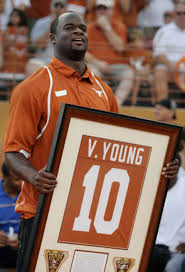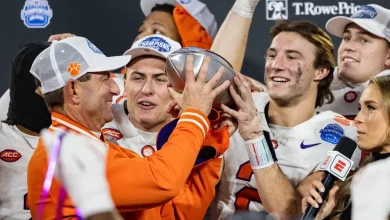Vince Young led Texas to a national championship, retired jersey number.

Vince Young’s name is forever etched in the history of college football as one of the greatest quarterbacks to ever play the game. His remarkable career, which spanned both college and the NFL, was defined by legendary moments, unforgettable performances, and an unwavering ability to deliver when it mattered most. From leading the Texas Longhorns to a national championship to his journey in the NFL, Young’s legacy continues to influence the world of football today. In 2024, Young’s academic accomplishments, including his graduation from the University of Texas, marked the completion of his journey, adding a new chapter to a story that continues to inspire athletes and fans alike.
Early Life and High School Career
Born on May 18, 1983, in Houston, Texas, Vince Young’s talent was evident from an early age. Growing up in one of the most competitive sports environments in the country, Young’s athleticism stood out even among his peers. Raised by his mother, Felicia Young, who was a strong influence in his life, Vince developed a strong work ethic and sense of determination. From the time he first picked up a football, Young knew he wanted to be a quarterback. It wasn’t long before his exceptional skill set earned him attention from high school coaches and scouts.
Young attended Madison High School in Houston, where he was a standout quarterback, known for his playmaking ability and dynamic style of play. In his senior year, he led his team to a state championship, throwing for over 2,000 yards and running for another 1,000 yards. His dual-threat ability was unmatched, and his performances quickly caught the eye of top college programs across the country. His high school career set the stage for what would be an extraordinary collegiate and professional journey.
College Career at the University of Texas (2003-2005)
In 2003, Young committed to play for the University of Texas, where he would play under head coach Mack Brown. Texas had already established itself as a powerhouse in college football, and Young’s arrival only added to the excitement surrounding the program. He joined a talented team that featured other future NFL stars and was expected to carry the Longhorns to new heights.
Young redshirted his freshman year in 2003, learning the ropes of college football and preparing for the competition at the highest level. In 2004, he saw his first significant action as the starting quarterback, replacing the injured Chance Mock. His first season as a starter was a revelation, as he showed the country his incredible athleticism and versatility. In 2004, Young passed for 1,155 yards and ran for another 1,079, leading the Longhorns to an 11-1 record and a spot in the Rose Bowl.
While Texas lost to Michigan in the 2005 Rose Bowl, Young’s play helped to solidify his status as one of the most dynamic quarterbacks in college football. His ability to both pass and run the ball with precision and power made him a unique threat, and his potential seemed limitless.
The 2005 and 2006 Seasons: A National Champion is Born
The 2005 season proved to be a turning point in both Young’s career and the history of Texas football. Young emerged as a Heisman Trophy finalist, and Texas became one of the most formidable teams in college football. Young’s play was instrumental in Texas finishing the regular season with an undefeated 12-0 record and a spot in the Rose Bowl against the USC Trojans.
The 2006 Rose Bowl, played on January 4, 2006, became one of the most iconic games in college football history. The Longhorns faced the defending national champion USC team, led by quarterback Matt Leinart and running back Reggie Bush. The game was a back-and-forth thriller, with both teams exchanging scores in dramatic fashion.
Young’s performance in that game was nothing short of legendary. He accounted for over 400 total yards—200 passing and 200 rushing—and scored three touchdowns, including the game-winning touchdown on a 4th-and-5 scramble with less than a minute remaining. His ability to make plays with both his arm and his legs was on full display, and his performance in the Rose Bowl cemented his place as one of the greatest quarterbacks in college football history.
Young’s heroics led the Longhorns to a 41-38 victory over USC, giving Texas its first national championship in 35 years. Young was named the MVP of the 2006 Rose Bowl for his outstanding play, and his performance became a defining moment in his career. He finished the 2005 season with 3,036 passing yards, 26 touchdowns, and 1,050 rushing yards, proving that he was capable of leading his team to victory in the most high-pressure situations.
2006 Heisman Trophy and Post-Championship Legacy
Following his national championship victory, Vince Young was widely considered to be one of the best quarterbacks in college football history. However, despite his dominant performance in the Rose Bowl, he finished second in the 2005 Heisman Trophy race to USC’s Reggie Bush, a decision that sparked controversy. Many believed that Young’s leadership and clutch performances throughout the season made him more deserving of the prestigious award, but the Heisman voting ultimately went to Bush.
Despite not winning the Heisman, Young’s legacy at Texas was secure. He had already led the Longhorns to their first national championship in decades, and his jersey number, 10, was retired by the University of Texas in recognition of his incredible contributions to the program. The 2006 national championship season became a defining moment for Texas football, and Young’s name would forever be associated with the program’s success.
2006-2007 NFL Draft and Professional Career
After leaving Texas following his junior season, Vince Young declared for the 2006 NFL Draft. He was selected with the third overall pick by the Tennessee Titans, joining a team that was in the midst of a rebuilding phase. Young’s transition to the NFL came with high expectations, as many believed he would bring the same magic that he had displayed in college to the professional ranks.
Young’s rookie season with the Titans was impressive. He showed flashes of the brilliance that made him a star at Texas, earning NFL Offensive Rookie of the Year honors. Over the course of his first few seasons, Young led the Titans to several successful campaigns, including a playoff appearance in 2007. He developed a reputation for his ability to make plays in the clutch, much like he had in college, and his dual-threat ability made him a unique and dangerous quarterback in the NFL.
However, Young’s time in the NFL was marked by inconsistencies. While his athleticism and playmaking ability were never in question, his struggles with his passing mechanics and decision-making ultimately prevented him from reaching the heights many had anticipated. Over the course of his six seasons in the NFL, Young played for several teams, including the Titans, Philadelphia Eagles, and Buffalo Bills. He had moments of success but never fully realized his potential as a starting quarterback in the NFL.
Despite these struggles, Young’s career in the NFL was far from a failure. He became known for his resilience and ability to overcome adversity, and his time in the league is still remembered by many as a testament to his talent and determination.
Life After Football and Graduation from Texas
Following his departure from the NFL, Vince Young shifted his focus to other pursuits, including business ventures and philanthropic efforts. He remained a beloved figure in the Texas Longhorns community, frequently returning to the university to offer support and guidance to current players. His involvement in various charitable endeavors further cemented his legacy as a positive role model.
In May 2024, Vince Young accomplished another significant milestone: he graduated from the University of Texas. His academic achievement marked the culmination of his journey, as he had spent several years balancing his football career with his education. Young’s decision to return to school and earn his degree was met with widespread praise, as it demonstrated his commitment to personal growth and education, something he had always valued alongside his athletic accomplishments.
Vince Young’s Legacy
Vince Young’s legacy as a Texas Longhorns legend is undeniable. His performance in the 2006 Rose Bowl, where he led Texas to a national championship victory over USC, will forever be remembered as one of the greatest moments in college football history. His dual-threat ability as a quarterback, combining both his arm and his legs, changed the way the position was viewed and helped define an era of college football.
Though his NFL career didn’t live up to the lofty expectations set by his college success, Young’s impact on the game remains significant. He was a pioneer of the modern mobile quarterback and was ahead of his time in terms of blending athleticism with quarterback play. His name is synonymous with Texas football, and his jersey number, 10, will forever be a symbol of his greatness.
Vince Young’s graduation from the University of Texas in 2024 signifies the completion of a remarkable journey, one that started on the football field but continues to inspire beyond the game. His story is a testament to the importance of perseverance, education, and self-belief. Young may have hung up his cleats, but his legacy, both on and off the field, will continue to inspire athletes for generations to come.









